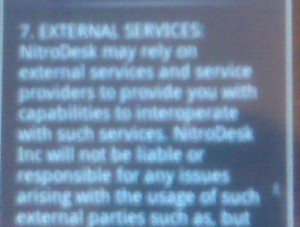Why do you use Taleo? It is at the top of the list for the biggest clusterfuck in whole arena of job applications. Number 1 from an applicants point of view.
While someone can apply for a job on many of the job boards with one click, and answer a few questions about skills or relocation (if defined by the company), Taleo, on the other hand, inevitably turns into a 3 hour exercise in frustration. I know I am not alone in this opinion.
I no longer bother with anything on Taleo. It shows that you, the company, are willing to torture the applicants.
This doesn’t weed out the non-serious, it weeds out the non-desperate (which is different). It weeds out the people who innovate, the people who don’t accept nonsense. And Taleo is nonsense.
Hosting your career section on Taleo tells us that you are a large company with an ocean of red tape, that you are about a decade behind the times, and that your human resources department is verging on sadistic.
Tell me this: On Taleo, why do I have to turn javascript ‘on’ and greatly lower my computer security? Right there, you are weeding out the people that care about, and are knowledgeable about security.
Why do I have to cut and paste 100 little boxes with the same information I have already pasted into Taleo for other companies? In this case you are weeding out the people that make efficient use of their time. My information is already entered on Dice, and Linked-in, and a couple other places.
Why do I need to create YET ANOTHER login on Taleo? My 3 hours of typing, re-typing, and cut and paste has already been done five times on Taleo. There simply won’t be a sixth time.
Why does the stupid little window use only the top half of my monitor? (bad programming)
Why can’t I click on a job title to open the detail in another window? It just opens the list again. (bad programming)
To use Taleo for your career host is just plain sadism. There are much better ways to refine your candidate list than to put us through the 3 hour obstacle course. I’m sure you are thinking that you don’t want to manually review 300 resumes for a position, but there are much better solutions than Taleo.
Taleo must have a very powerful sales team. And I would guess they cost a fortune. It seems like a good way to spend money to make applicants hate you.
